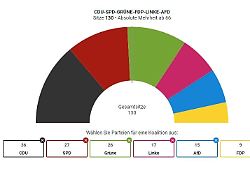ntv.de coalition calculator
Berlin election: who with whom on the Spree?
02/10/2023 12:37 p.m
Political novelty in the German capital: For the first time in the history of the Federal Republic, an election at state level has to be repeated. How are the majorities this time? A look at the ntv.de coalition calculator with the current numbers.
Next Sunday there will be elections in Berlin: Almost 2.5 million eligible voters in the German capital are called upon to redefine the balance of power and majority in the Berlin House of Representatives. The latest polls before election day point to significant gains for what has been the strongest opposition party, the CDU. The previous government alliance of SPD, Greens and Left Party has to be prepared for a loss of votes compared to the election in September 2021.
The ntv.de coalition calculator for the Berlin House of Representatives election 2023:
Based on the latest poll results, the outcome of the election is close. Will the result be enough for a continuation of the red-green-red government coalition under Governing Mayor Franziska Giffey (SPD)? Can the Greens under top candidate Bettina Jarasch overtake the SPD in the last few meters in the repeat election? Or will there be a change of power in Berlin with CDU man Kai Wegner?
In the polls, the CDU clearly leads the Social Democrats by up to 26 percent. For the SPD, the pollsters expect a result between 17 and 21 percent. The Greens, who currently govern with the SPD and the Left in a three-party coalition, are seen at 17 to 18 percent. According to the surveys, the Left reached 11 to 12 percent, the AfD 10 percent and the FDP 5 to 6 percent. This shakes the entry of the FDP into the House of Representatives.
In purely mathematical terms, with these values, a continuation of the governing coalition of SPD, Greens and Left would be possible. Tripartite alliances led by the CDU would also have a majority – but there is not much political leeway here. Under certain circumstances, it could also be enough for a coalition of CDU and SPD after the House of Representatives election. A lot depends on whether the Liberals in Berlin make it over the five percent hurdle.
The top candidates of the CDU and SPD have so far avoided making clear statements about possible coalitions shortly before the election. Giffey and Wegner each reaffirmed their leadership claims.
It is up to the voter to decide
“I’m not running a coalition election campaign,” said the governing mayor two days before the election date. She is sticking to the goal of making the SPD the “leading force” in Sunday’s election. The top candidate of the leading CDU in the polls, Wegner, stated that his election goal was a “political change”. This will only happen with a “strong CDU,” he said. In the end, the surveys are only “snapshots”. Now the voters have to decide.
The Berlin House of Representatives is the state parliament of Berlin and consists of at least 130 members. Of these, 78 are elected in the constituencies according to the principles of relative majority voting (first vote) and the others are elected from lists (second vote). Only nominations that receive at least 5 percent of the second votes or a direct mandate will be considered. The deputies are usually elected for five years.
There were serious glitches in the regular election for the House of Representatives parallel to the federal election on September 26, 2021. The Berlin Constitutional Court therefore decided last November that the elections to the House of Representatives and to the district assemblies are invalid and must be repeated.
